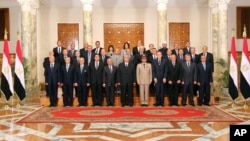CAIRO —
Members of Egypt's new military-backed interim government took the oath of office Tuesday, following violence overnight between police and supporters of ousted President Mohamed Morsi.
The new Egyptian interim cabinet was sworn in before interim President Adly Mansour in a ceremony at the presidential palace. The new ministers vowed to defend Egypt's constitution, its republican form of government and its borders.
Veteran economist Hazem el Beblawi, who heads the new cabinet, was the first to be sworn in. Defense Minister Abdel Fattah el Sissi, the military leader who was key in ousting President Mohamed Morsi, continues in his post and becomes first deputy prime minister.
The new interim government is a mix of political figures and technocrats. The 35-member cabinet includes three women, several Christians and several figures who are Islamists. The Muslim Brotherhood and the Salafi Nour Party refused to participate.
Scattered clashes in Cairo overnight left at least seven people dead and scores wounded. Security forces arrested 400 people for questioning about the violence.
The bloodshed came after supporters of the ousted elected president tried to block traffic at several key intersections and along a main Cairo bridge. Police and residents of nearby Giza stopped the protesters before they were able to cross the bridge.
Al Ahram Online reported that some Morsi supporters were holed up at a mosque near Ramsis Square where violence first broke out. Witnesses say police fired tear gas to prevent the protesters from reaching nearby Tahrir Square where Morsi opponents were camped out.
Egypt's presidential spokesman Ahmed Muslimany told journalists the country's tumultuous recent history, including the divisive eras of two former presidents and a military government, had pitted Egyptians against each other:
He said that three different political periods of recent history have created rival ideologies and pitted everyone against everyone else. He said Egypt's interim presidency was now proposing that everyone work with each other, respecting each other's points of view, and living together despite their differences.
Muslimany went on to say that each rival political faction contains both moderates and extremists. But, he argued, political life in every country centered on these factions coming to a consensus, since cooperation was needed for society to function.
Visiting Deputy U.S. Secretary of State William Burns echoed those ideas, urging Egypt's new interim leaders not to exclude anyone from a new government. Egyptians, he insisted, must “come together to find a nonviolent and inclusive path forward.”
The new Egyptian interim cabinet was sworn in before interim President Adly Mansour in a ceremony at the presidential palace. The new ministers vowed to defend Egypt's constitution, its republican form of government and its borders.
Veteran economist Hazem el Beblawi, who heads the new cabinet, was the first to be sworn in. Defense Minister Abdel Fattah el Sissi, the military leader who was key in ousting President Mohamed Morsi, continues in his post and becomes first deputy prime minister.
The new interim government is a mix of political figures and technocrats. The 35-member cabinet includes three women, several Christians and several figures who are Islamists. The Muslim Brotherhood and the Salafi Nour Party refused to participate.
Scattered clashes in Cairo overnight left at least seven people dead and scores wounded. Security forces arrested 400 people for questioning about the violence.
The bloodshed came after supporters of the ousted elected president tried to block traffic at several key intersections and along a main Cairo bridge. Police and residents of nearby Giza stopped the protesters before they were able to cross the bridge.
Al Ahram Online reported that some Morsi supporters were holed up at a mosque near Ramsis Square where violence first broke out. Witnesses say police fired tear gas to prevent the protesters from reaching nearby Tahrir Square where Morsi opponents were camped out.
Egypt's presidential spokesman Ahmed Muslimany told journalists the country's tumultuous recent history, including the divisive eras of two former presidents and a military government, had pitted Egyptians against each other:
He said that three different political periods of recent history have created rival ideologies and pitted everyone against everyone else. He said Egypt's interim presidency was now proposing that everyone work with each other, respecting each other's points of view, and living together despite their differences.
Muslimany went on to say that each rival political faction contains both moderates and extremists. But, he argued, political life in every country centered on these factions coming to a consensus, since cooperation was needed for society to function.
Visiting Deputy U.S. Secretary of State William Burns echoed those ideas, urging Egypt's new interim leaders not to exclude anyone from a new government. Egyptians, he insisted, must “come together to find a nonviolent and inclusive path forward.”





